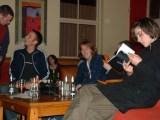Churchless Faith
Friday, April 28, 2006

Alan Jamieson, author of 'A Churchless Faith' and 'Journeying in Faith', is in London on Tuesday (2nd May) speaking about his latest research (and book) revisiting the stories of church leavers five years on. The blurb he has given for Tuesday's gathering is...
faith journeys of church leavers five years down the track
Findings and stories from the first longitudinal study on the faith of church leavers.
What happened to people's faith beyond institutional forms of church?
What is the role of small groups like SE? What supports really supported people's faith?
How can churches learn to listen to the real concerns of leavers?
SE UK is linked to the amazing work that Jenny has been involved in over in New Zealand, and shares the same ethos (emergingchurch.info have a great interview with Jenny about this here). The intention is to facilitate and resource a network of groups across the country that will provide safe space for people who have left church to process their developing faith without feeling they have to tow a particular party line. Several such groups are already informally meeting in the UK, and SE UK is gathering info about them so that others in a similar place spiritually and geographically can find out what support is available. There's no big hidden agenda to revolutionise the church or change the world - it's simply about enabling people who feel they can't belong in church to find alternative places of belonging (at whatever level they're comfortable with) and support.
Tuesday's gathering with Alan Jamieson is from 12.30 to 2pm at CMS (157 Waterloo Road, London SE1 8UU) - a free sandwich lunch is provided! If you'd like to come along, please email spiritedexchanges@btinternet.com to register.
Labels: churchless faith
what's in a word?
Tuesday, April 25, 2006

Following on from Marko's excellent post 'this is emergent', where he looks at emergent behaviour in nature and uses it as a metaphor for the 'emergent church', there has been a bit of a flurry of blog activity around the theme of terminology. Dab Kimball posts two informative articles on the origin of the 'emergent' tag here and here; and Andrew Jones gives his perspective here.
Prior to all this though, Eddie C posts a less-than positive 'rant' (his description, not mine) about how the terminology is creating barriers and cliques, negating what the 'movement' claims to be all about. While I have some sympathy with the reflections of Eddie C, and am not at all interested in being part of a new movement that becomes a new denomination seen by those within as 'better' than other forms of Christianity, I do think that the terms, when used rightly, can serve as useful reminders and markers as to what it's all about.
To add a UK perspective to the discussion, we would have to introduce the terms 'Emerging Church' and 'Fresh Expressions' to the melting pot. Notwithstanding the criticisms of Eddie C, and conscious that all terminology falls short and carries problems, both of these tags offer helpful insights...
Emerging Church is a good reminder of what the Church should always be - emerging. Churches always hit the self-destruct button when they get complacent and think that they've arrived. The Church, from the first century to today, has always been and will always be 'emerging'. Tom Wright, in 'The New Testament and the People of God' writes about the task of the church being to 'faithfully improvise' what it means to be the community of faith in each cultural setting. Whilst remaining faithful to the story so far (the first four acts - creation, fall, Israel, Jesus), we as participants in the fifth act need to improvise, or quite literally 'make up' our own journey in relationship with Christ. In this sense, the Church is always emerging.
Fresh Expressions is the term coined by the Church of England report 'Mission-Shaped Church' to describe new forms of church communities. Although this term is, perhaps unhelpfully, fast becoming a catch-all term attached to any and every 'new' initiative, it does help challenge the status quo. To talk of fresh expression of church implies that 'church' is something bigger than these 'expressions'. If we are to remain consistent, this must naturally extend to every other church community, and so what might happen in St Whoever's Church on a Sunday morning at 10:30 (or whenever) is merely an expression of this bigger thing we call 'Church'. What's more, it's a culturally bound expression - church being lived out in the cultural clothing of those who belong to that community.
In a fragmented 'post-modern' context, with many cultures living side by side, we must have room in the Church for numerous different expressions of what it means to be the community of faith, as the Church continues to 'emerge' in our times.
Later today I'll be conducting my first research interview of a practitioner engaged in the emerging church. Amongst the questions I'll be asking of him, is this... "Do you personally identify with and find helpful the terms 'post-evangelical', 'post-protestant' or 'Emergent' and what do you understand by the terms 'Emerging Church' and 'Fresh Expressions'?" I wonder how many different responses I would get to a question like that if I was able to interview everyone involved in what is being called the 'emerging church'?
Labels: emerging church
Manchester Passion #2
Wednesday, April 19, 2006
 OK, so some of the songs used in the Manchester Passion didn't work too well (not too sure about the point of the M People stuff, but then I've never been much of a fan!) but other songs worked REALLY well. I found the Last Supper with the words of institution interspersed with Joy Division's 'Love Will Tear Us Apart' very powerful.
OK, so some of the songs used in the Manchester Passion didn't work too well (not too sure about the point of the M People stuff, but then I've never been much of a fan!) but other songs worked REALLY well. I found the Last Supper with the words of institution interspersed with Joy Division's 'Love Will Tear Us Apart' very powerful.The best for me though, and the most enlightening in terms of re-interpreting a well listened to song, was the use of James' 'Sit Down' in the Gethsemane scene. The chorus obviously chimes with Jesus 'watch and pray' request of Peter and co, but was I alone in spotting the parallels with the Beatitudes from the Sermon on the Mount (I know I wasn't because my wife pointed it out to me!!)...
Labels: mission, popular culture
Manchester Passion
Saturday, April 15, 2006
Labels: mission, popular culture
marking the passion
Thursday, April 13, 2006

I received an email this morning asking the following question... "how are Maundy Thurday - Good Friday - Easter Sunday celebrated in different emerging Church groups? I'd be interested to see new ritual forms."
For our part, Dream in Liverpool City have a service tonight titled 'watch & pray - an easter vigil'. By way of outline, we'll begin with a call to worship and then a visual meditition on the events of the Passion (found 'here'), leading into space for prayer and reflection aided by four stations focussing respectively on 'Gethsemane', 'The Trial', 'The Journey to Golgotha', and 'The Cross'. After this, we'll come together to share Communion. The aim of the service is to provide plenty of space for guided reflection, prompted by Jesus instructions to his disciples in Gethsemane to 'watch and pray'.
So that's our response to the emailer! It'd be great if other responses could be posted here. How is your community marking the events of the passion?
After stating that I'll be posting every Tuesday, I'm away next week (hitting the family trail!) so skip a week and come back on 25th April!!
Labels: Dream
standing the test of time
Tuesday, April 11, 2006
when is 'community' community?
Monday, April 10, 2006
 At the beginning of 2004, 'Dream in Liverpool City' (then simply 'Dream') took the decision to step back from organising monthly labour-intensive altworship 'events' in city centre bars to focus on building genuine community. Prior to this we'd been gathering anywhere between 40 and 70 people on the first Thursday evening of each month, including several who had little or no prior contact with the 'Church'. However, we were aware that, despite the event having the appearance of being succesful, there was little or no relationship building going on - people came with a bunch of mates and stayed with those same mates. What's more (and I guess this was a bigger 'problem') the core group of about half a dozen people, who had been meeting regularly as a community for a year before starting Dream and had given birth to the vision, had become nothing more than a frantic planning group for the next Dream service, so running out of energy, inspiration and ideas. During a Dream event we would spend all night running around to make sure the increasingly ambitious services went smoothly rather than chatting to the people who came, and when we met outside of the Dream services it was with a tight agenda to plan the next one. We weren't building community... or were we?
At the beginning of 2004, 'Dream in Liverpool City' (then simply 'Dream') took the decision to step back from organising monthly labour-intensive altworship 'events' in city centre bars to focus on building genuine community. Prior to this we'd been gathering anywhere between 40 and 70 people on the first Thursday evening of each month, including several who had little or no prior contact with the 'Church'. However, we were aware that, despite the event having the appearance of being succesful, there was little or no relationship building going on - people came with a bunch of mates and stayed with those same mates. What's more (and I guess this was a bigger 'problem') the core group of about half a dozen people, who had been meeting regularly as a community for a year before starting Dream and had given birth to the vision, had become nothing more than a frantic planning group for the next Dream service, so running out of energy, inspiration and ideas. During a Dream event we would spend all night running around to make sure the increasingly ambitious services went smoothly rather than chatting to the people who came, and when we met outside of the Dream services it was with a tight agenda to plan the next one. We weren't building community... or were we?Zygmunt Bauman, in 'Community: Seeking Safety in an Insecure World', outlines two types of contemporary community. Dream as described above could arguably be identified as Bauman's 'aesthetic' community, with the altworship service being the 'peg' around which we gathered. In line with Bauman's description of such communities, there were no ties or obligations being formed for those who were coming - they could simply peg into the event and then forget about Dream until the following month (although this was not the case for the core planning group). Indeed, this may have been the attraction for many of those who came along to Dream.
Now, two years on from the decision, Dream in Liverpool City looks much more like Bauman's 'ethical' community - a small group of 6-10 people who meet more regularly for worship (still creative and open, closely identifyable with what might be termed 'altworship') as well as some social events. It's now feels more like a community, in the sense of members knowing each other better, supporting each other in the faith journey, and forming ties outside the gathered events.
All of this begs the question... is the Dream of 2006 better than the Dream of 2004? Is community more authentic now? How do we determine what is and what isn't community? Was the aesthetic community of 2004 a pretence of community, or was it authentic in a different way?
Steve Taylor has a great chapter on this in 'The Out of Bounds Church', where he argues that in an age of spiritual tourism both of Bauman's community types are essential to our missiology. He writes that in some sense, the church is both peg and ethical - "The love of God demands ethical discipleship within an ethical community. The love of God offers a place to gently explore that love in a peg community." (page 129)
But is the aesthetic without the ethical genuine community? What about virtual internet communities? Acts 2:44-47 may give us reason to argue for the primacy of ethical community but does this render other types of community substandard or even worthless? Do we have a 'meta-narrative' of community or can we accept all forms (virtual and physical, permanent and transitory) as equally valid? When is 'community' community?
up and running
Tuesday, April 04, 2006
the questions...
why have I set up a blog?
am I really that vain?
will anyone want to read it anyway?
the answers...
because... (read on)
maybe but hope not
hope so, and more than just read it!
So why a blog? I've been reading nearly 40 blogs concerned with altworship and emerging church for some time now, which have helped fuel my own journey and have contributed to my developing thinking about church, mission and contemporary culture that is so much a part of my daily work as well as my driving passion (see 'about me'). For a while I've considered joining the blogging world, and have done so now and again through the Dream blog as a member of the 'Dream in Liverpool City' community.
But the time is right now to host my own blog...
As well as being actively engaged in the emerging church, I'm also a year into a part-time MPhil researching the emerging church movement/discussion as an attempt to re-contextualise authentic Christian community in postmodern times. I'm soon to dive into 6 months of field-work (that's the technical term!) engaging as fully as time will allow in two emerging churches in the North-West of England (more to come...) As part of reflecting on this experience, and as a way of processing my ongoing reading, I thought a blog would be a good way to go - that's why I'm not just hoping for visitors who will read it, but people who will actively contribute by arguing with me (and who knowns maybe agreeing too), sharing their persectives and views on the issues I'm grappling with. As you do, you'll be adding to my data-source, giving me valuable material to sift through and utilise in the final thesis. And if all that sounds just a bit too heavy... I'm hoping there will also be a healthy dose of irony and larking about along the way!
This is not a blog that you will need to visit every day to keep up with - I'll be posting on Tuesdays mainly, and other bits and pieces as they drift through my brain may come inbetween. The first main post to get discussion going will be on Tuesday 11th April - make sure you come back then!
So, if you're up for being involved...
welcome on board...
hope you enjoy the ride...

 I'm Malcolm Chamberlain
from Liverpool, United Kingdom
. I'm married with two young children and, in addition to Liverpool, have lived in Leicester (for the first 18 years of my life), York, Peshawar (Pakistan), Oxford and Walsall. I've been actively involved in the emerging church since 2001, as a founding member of Dream in Liverpool City, and coordinator of the Dream network. I'm currently engaged in research into emerging missional communities, and work as a parish priest and pioneer minister.
I'm Malcolm Chamberlain
from Liverpool, United Kingdom
. I'm married with two young children and, in addition to Liverpool, have lived in Leicester (for the first 18 years of my life), York, Peshawar (Pakistan), Oxford and Walsall. I've been actively involved in the emerging church since 2001, as a founding member of Dream in Liverpool City, and coordinator of the Dream network. I'm currently engaged in research into emerging missional communities, and work as a parish priest and pioneer minister.










